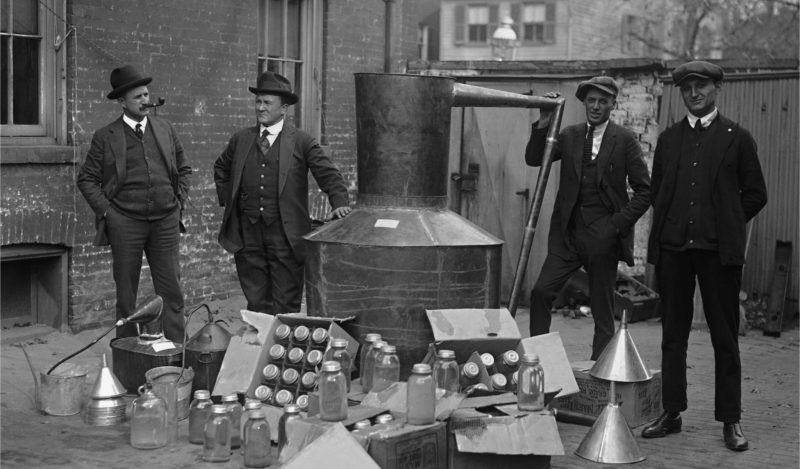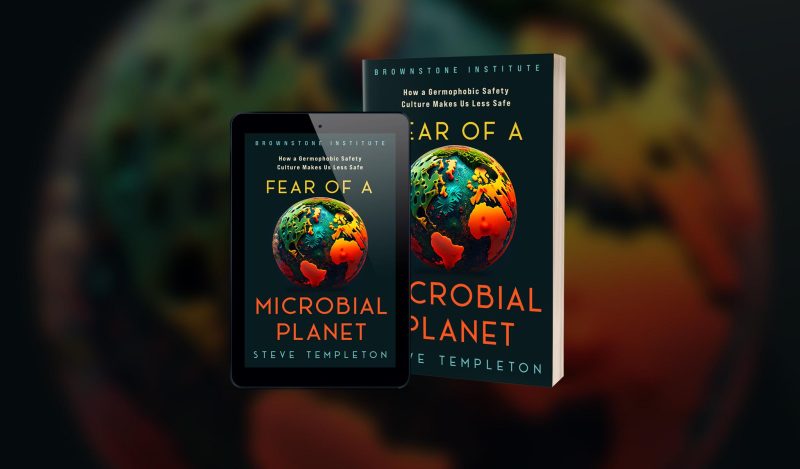Most people today regard America’s experiment with alcohol prohibition as a national embarrassment, rightly repealed in 1933. So it will be with the closures and lockdowns of 2020-21, someday.
In 1920, however, to be against the rising tide of prohibition took courage. People assume that the main lobbyists were religious folk who denounce “demon rum,” or perhaps the would-be bootleggers who imagined huge profits in black markets. In fact, what pushed the Constitutional amendment over the top, and swung so many lawmakers in the direction of a complete prohibition of production, was in fact the science at the time.
In those days, when you were arguing against prohibition, you were opposing opinion backed by celebratory scientists and exalted social thinkers. What you were saying flew in the face of “expert consensus.”
There is an obvious analogy to covid lockdowns and other coercive disease mitigation measures.
My first inkling of this prohibition history came in reading transcripts of the then-famous Radio Priest James Gillis from the 1920s. He was against prohibiting alcohol production and sale on grounds that the social costs far outweighed the supposed benefits.
What surprised me was the defensiveness of his comments. He had to assure his listeners that he was personally for temperance, that alcohol was indeed demon rum, that it’s true that this nasty stuff had caused terrible things to happen to the country. Still, he said, outright bans are too costly.
Why was he so cautious in his rhetoric? It turns out that during the 1920s, he was one of the few famous American public figures (H.L. Mencken was also among them) who dared to speak out against what was obviously a disastrous policy. Reading this sent me down a rabbit hole of literature at the time in which it was argued by many leading intellectuals that Prohibition made perfect sense as a necessary step to clean up the social order.
To sum up the “science” behind Prohibition, society had tremendous numbers of pathologies on the loose and they all traced to one dominant variable: liquor. There was poverty, crime, fatherless households, illiteracy, political alienation, social immobility, city squalor, and so on. You can look carefully at the data to find that in all these cases, there is a common element of alcohol. More than any other single factor, this one jumped out as the main one, and hence the most plausible causative agent.
It only stands to reason – if you think in this two-dimensional way with no thought to unintended consequences – that eliminating this factor would be the single greatest contribution to eliminating the pathologies. Ban the liquor and you strike a blow against poverty, sickness, family breakup, and crime. The evidence, as they understood it, was incontrovertible. Do this, then that, and you are done.
To be sure, the argument wasn’t always this clean. Simon Patten (1852-1922) was chair of the Wharton School of Business. His late 19th-century argument for alcohol prohibition featured a complicated argument concerning the weather in America. It gets cold then hot then cold and alcohol consumption seems to track these changes, driving people to drink ever more until their lives fall apart.
As summarized by Mark Thornton, who is the leading scholar on the economics of Prohibition and its history, “For Patten, alcohol is a product with no equilibrium in consumption. One is either good and abstains from alcohol, or one becomes a drunkard and self-destructs.”
The most influential pro-Prohibition economist of the next generation was the rock star academic and social progressive Irving Fisher, whose contributions to making economics more about data than theory are legendary. So was his push for eugenics. No surprise if you know this period and such people, but he was also a passionate opponent of all alcohol. It was he who made a decisive difference in convincing Congress and the public that a complete ban was the right way. His oddly titled book Prohibition at Its Worst (1927) lays it all out.
The same year of its publication, Fisher called for a roundtable at the annual meeting of the American Economic Association. His own account is revealing.
I got a list of the economists who are supposed to be opposed to Prohibition, and wrote to them; they all replied either that I was mistaken in thinking that they were opposed to Prohibition or that, if we were going to confine the discussion to the economics of Prohibition, they would not care to respond. When I found that I was to have no speaker representing the opposite point of view, I wrote to all American economists listed in “Minerva” and all American teachers of statistics. I have not received from any one an acceptance.
Clearly his colleagues were either bamboozled by the prevailing “science” or afraid to disagree with the reigning orthodoxy. Even as political establishments were being corrupted, crime and liquor lords were rising up all over the country, and tens of thousands of speakeasies were thriving.
Claiming that Prohibition had created $6 billion in wealth for the U.S. – a figure that was frequently cited as authoritative, Fisher wrote the following:
Prohibition is here to stay. If not enforced, its blessings will speedily turn into a curse. There is no time to lose. Although things are much better than before Prohibition, with the possible exception of disrespect for law, they may not stay so. Enforcement will cure disrespect for law and other evils complained of, as well as greatly augment the good. American Prohibition will then go down in history as ushering in a new era in the world, in which accomplishment this nation will take pride forever.
To see how the $6 billion figure was calculated and to observe the rest of the astonishing mathematical gymnastics behind the “science” backing Prohibition, have a look at Thornton’s detailed presentation. It’s a perfect picture of pseudoscience in action.
But it was hardly unusual for the time. The Journal of the American Medical Association said of alcohol prohibition in 1920: “Most of us are convinced that it is one of the most beneficent acts ever passed by a legislature.”
Reading through all this literature, I’m reminded of the CDC scientific conclusion that closing restaurants during a pandemic will save lives – a conclusion based on a study so weak that anyone with a passing familiarity with statistics and causality can immediately observe its failings (the same study, if it demonstrates that, would also demonstrate that masks make no difference in virus spread). Another obvious case was the brutal and unscientific closures of schools.
Also true is that the opponents of Prohibition were routinely and publicly denounced as secret drunks, shilling for bootleggers, or just not following the science. In our times, the opponents of lockdowns are called grandma killers, anti-science, and anti-vaxxers. It’s smears coming and going.
The opponents of Prohibition were the outliers and stayed that way for a decade. What finally broke Prohibition was not the replacement of one scientific orthodoxy for another but the noncompliance on the part of most of the population. When enforcement became unviable, and FDR saw opposition to Prohibition as politically advantageous, the law finally changed.
When we look back on American history, Prohibition stands out as one of the most implausible, destructive, and unviable social and economic experiments of modern times. The very idea that the government, on its own authority and power, was going to purge from a Western society the production and distribution of alcohol, strikes us today as a millenarian pipedream, one that turned into disaster for the whole country.
We could say the same about Covid lockdowns and all the other disease mitigation strategies, now simply called public-health measures (even though they are anything but). Indeed, measuring the absurdities on a scale of extremism, the idea of lockdowns, with forceful human separation, mandatory masking, and the practical abolition of all large gatherings, fun, art, and travel, seems even more sadistically preposterous than alcohol prohibition.
With the endless variants and the continued push for magical solutions such as forced vaccines and mask mandates, the lockdown brigade is holding on to their agenda and policies as long as possible. Science has been badly corrupted in the process but not for the first time. Danger always comes with the politicization of science.
There are just too many people in the scientific field who are desperate to lend their expertise and credentials in ways that make a dent in the path of history. Working with and for a government agenda, backed by the populist hysteria of the moment, the most naively ambitious among them find themselves embroiled in the most unscientific of enterprises, those that use the force of law to impose an untested and widely disputed solution to a problem that otherwise admits of no easy answer.
The result is to fuel the madness of crowds, justified in the name of the “best science.” This tendency never goes away. It just finds new forms of legal expression in new times. Only once the crowds come to their senses do the real scientists make a comeback and prevail, while the fake science that backed despotism pretends like it never happened.
A version of this piece first ran at aier.
Published under a Creative Commons Attribution 4.0 International License
For reprints, please set the canonical link back to the original Brownstone Institute Article and Author.









